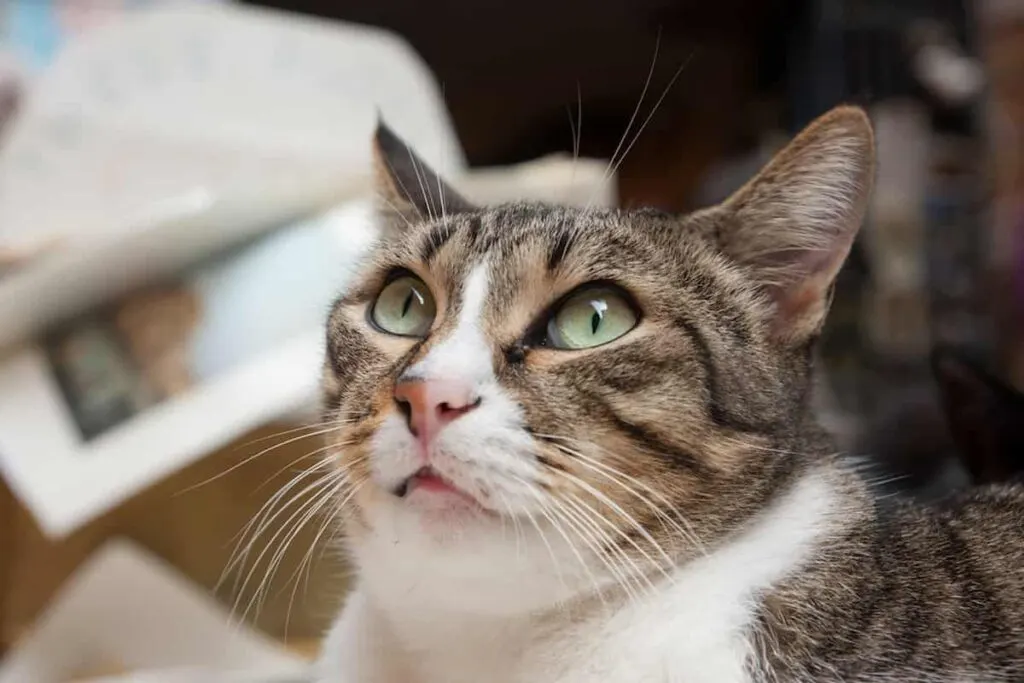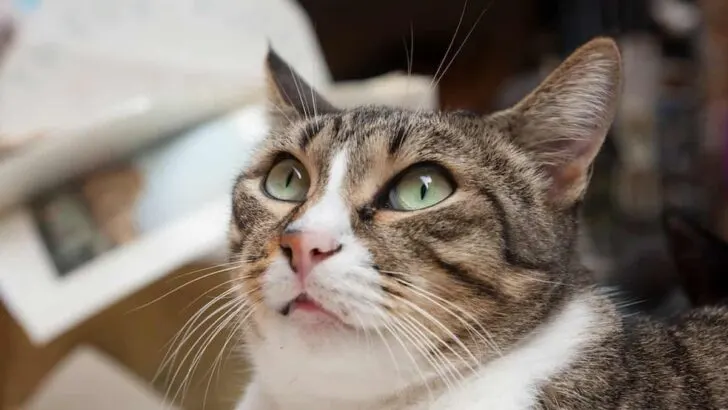It’s not unusual to feel the penetrating stare of your cat on you – but did you know that it can say a lot about their thoughts and feelings? In this article, we’ll uncover why cats may be staring at us intently and how owners should respond. Learning more about our feline friends’ behavior will help enrich our relationship with them!

Common Reasons Why Cats Stare
There are several reasons why cats stare at their owners. Some of the most common reasons include the following:
Attention Seeking Cats
Cats frequently utilize staring as a means of obtaining their owners’ focus. If your feline companion is looking at you, they could be trying to communicate that they want something from you, such as food, playtime, or petting. If you ignore this persistent gaze, the cat may become more determined and start meowing to get what it wants!
Here are three tips for responding to an attention-seeking stare:
- Give your cat what they want: Is your feline friend gazing at you? They may be imploring for something – food, playtime, or tenderness. Show them the love they deserve by responding to their stare and providing whatever may bring them joy!
- Pay attention to their body language: In addition to staring, cats use other body language cues to communicate their needs. Pay attention to your cat’s tail, ears, and posture to better understand what they want.
- Avoid ignoring their gaze: If you don’t react to your cat’s gaze, they may become increasingly persistent and use vocalization or other tactics to get your attention. However, responding positively to their visual contact will help foster a strong relationship between you.
Hunting Instincts Kick In
Cat owners often find themselves frustrated by their cats’ natural hunting instincts, which can lead to extended periods of staring at birds and squirrels out the window. Any movement or potential prey spotted sends cats into a focused state as part of their evolutionary drive for survival.
To appease your cat’s natural predation tendencies, offer stimulating playthings such as interactive feeders or puzzles. This will help keep their predatory instincts in check while providing enjoyable activities.
Here are three tips for managing your cat’s hunting instincts:
- Provide plenty of toys and activities: Providing your feline with diversions and toys that ignite their natural hunting skills can help keep them from yearning for the wildlife beyond their window.
- Encourage exercise: Regular exercise is highly recommended to keep your feline companion’s hunting urges in check. Aim to spend 15 minutes daily playing with your cat using toys that imitate its prey!
- Consider using a bird feeder or squirrel feeder: Is your feline friend constantly gazing out the window at birds and squirrels? Then provide them with an appropriate outlet for their natural hunting instincts by installing a bird or squirrel feeder. This way, they can get closer to nature without endangering any wildlife.

Curiosity
Cats are naturally curious creatures and may stare at their owners simply because they are interested in what they’re doing. If your cat is staring at you while you’re working or reading, it may be trying to figure out what you’re doing. To satisfy your cat’s curiosity, try to provide them with plenty of toys and activities that stimulate their minds, such as climbing towers or puzzle feeders.
Here are three tips for keeping your cat’s curiosity satisfied:
- Provide plenty of toys and activities: Giving your cat plenty of toys and activities that stimulate their minds can help satisfy their curiosity. Try to provide a variety of toys, including climbing towers, puzzle feeders, and interactive toys.
- Encourage playtime: Regular playtime can also help satisfy your cat’s curiosity. Try to play with your cat for at least 15 minutes a day, using toys that mimic prey.
- Create a safe and exciting environment: Creating a safe and interesting environment for your cat can also help satisfy their curiosity. Try to provide plenty of hiding spots, perches, and other areas for them to explore and play.
Your Cat Is Being Affectionate
When your cat looks at you with loving, content eyes while purring softly, they are likely trying to express its appreciation and affection towards you. Cats may use this method of communication when feeling incredibly relaxed and happy.
Give back your cat’s loving gaze and offer them gentle stroking or petting to respond to their adoring stare.
Here are three tips for responding to an affectionate stare:
Return your cat’s gaze: If your feline companion is staring at you with affectionate and tranquil eyes, return their gaze and show them how much they mean to you.
- Give them a gentle pet or rub: Strengthen your relationship with your feline companion through simple petting and massaging. Not only will this strengthen the emotional connection between you and your beloved cat, but it can also help them feel soothed and contented.
- Spend quality time with your cat: Taking a moment to engage in quality activities such as playing or cuddling with your beloved feline can immensely strengthen the bond between you and your pet. Not only that, it’s likely to make them feel more secure and relaxed, which could lead to more loving moments from your kitty down the line.

Medical Reasons for Staring
When a cat stares, it could be an indication of medical troubles. The underlying causes may range from vision complications to neurological issues and ear infections.
If you are worried that your cat’s constant gaze is symptomatic of an underlying health issue, booking a veterinary appointment is critical.
Here are three crucial points to keep in mind when it comes to medical reasons for staring:
- Staring can be a medical issue: If your feline companion exhibits a sudden or persistent staring behavior, it may indicate an underlying medical problem.
- Common medical conditions include vision problems and neurological issues: From vision impairments to neurological disorders and ear infections, cats’ listless gazes can indicate various medical issues.
- Seek veterinary care as soon as possible: If you have any inkling that your cat is staring due to a medical problem, you must contact your veterinarian right away. Through careful diagnosis and treatment, they can help make sure your beloved feline is back to feeling better in no time!
The Takeaway
If you’ve ever caught your pet feline giving you an intense gaze, there’s likely a purpose behind it. Cats tend to stare at their owners for numerous reasons, such as requesting attention and affection, exercising their hunting instincts, or simply out of pure curiosity.
By reading your cat’s body language and behavior correctly, you will be able to understand them better and build a stronger relationship with each other that could last for years!
If your feline is staring for medical reasons, it’s important to see a vet immediately. With the correct attention and care, you can establish an enduring bond with your pet that will bring immense joy and friendship into both of your lives.

My name is James, and welcome to FAQCats!
Along with our team of cat owners, expert pet enthusiasts, and pet professionals, we aim to write engaging helpful, engaging content about cats. At FAQCats we strive to provide content that’s accurate and fun to read. Our team writes about everything related to cats; even the most complex of topics. Through extensive research and caring for our own fur-pals, we’re able to provide something cat owners worldwide will love. Have a look around, and leave us feedback anytime!

